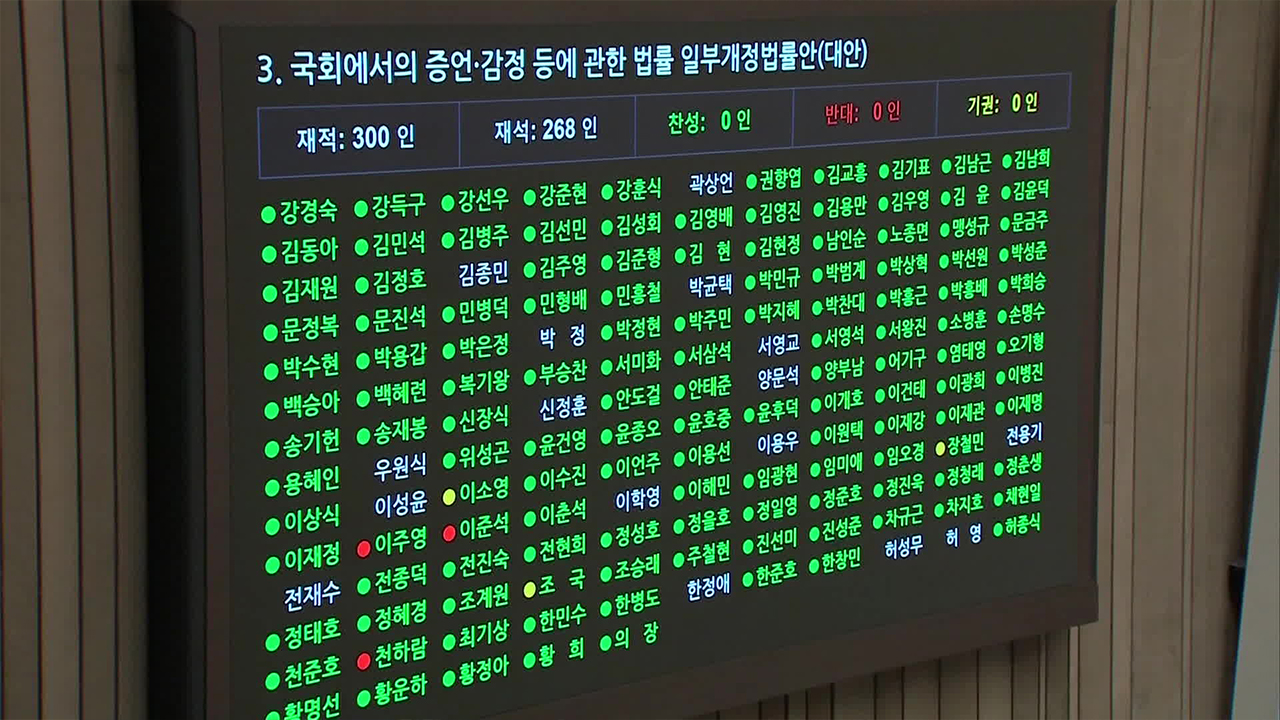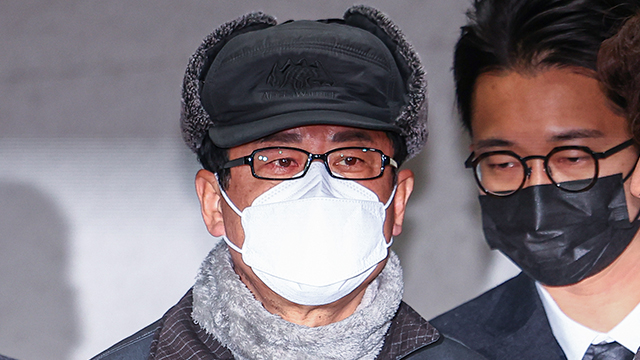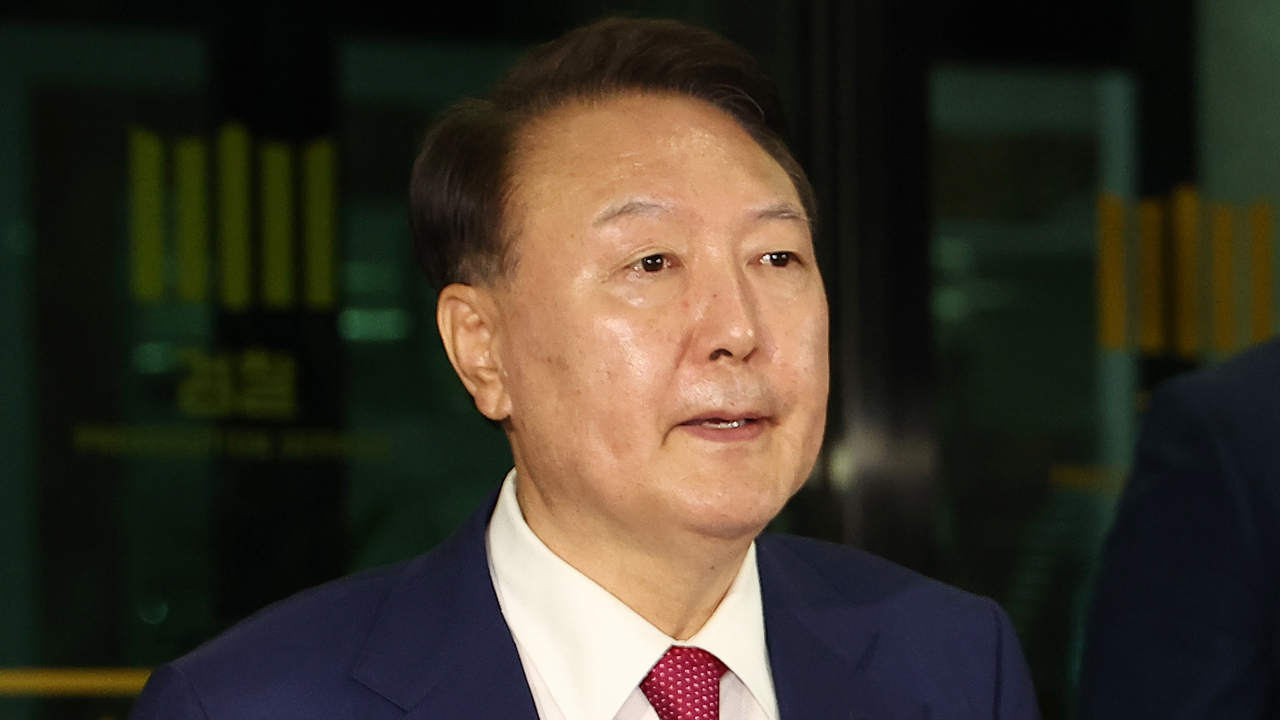What is the National Assembly Testimony and Appraisal Act?
입력 2024.12.19 (23:55)
읽어주기 기능은 크롬기반의
브라우저에서만 사용하실 수 있습니다.
[Anchor]
Today (12.19), among the bills returned to the National Assembly, the amendment to the Act on Testimony and Appraisal before the National Assembly is particularly raising concerns in the business community.
Reporter Choi Yoo-kyung has investigated why this is the case and how it is being handled overseas.
[Report]
In the past, conglomerate leaders who were selected as witnesses for national audits and hearings due to controversies over infringing on local commercial districts failed to appear and were fined.
To prevent the rampant non-appearances and to fulfill citizens' right to know, the Democratic Party has proposed the amendment to the National Assembly Testimony Act.
The business community has expressed concerns.
[Chey Tae-won/Chairman of the Korea Chamber of Commerce and Industry/Dec. 17: "We need more time regarding the bill that the business community is concerned about...."]
Expanding the scope of issuing summons regardless of national audits and hearings could lead to frequent summons of business leaders, which may stifle corporate activities.
Additionally, if the National Assembly requests personal information or trade secrets, it has been customary to refuse submission until now, but if this is prohibited, there are claims that it could lead to technology leaks.
The provision that requires online attendance even during overseas business trips has also become a point of controversy.
[Business community official: "There are many concerns that this does not align with the urgent global business environment of companies."]
In contrast to us, in the United States, it is often seen that prominent CEOs from the IT industry gather in Congress.
While there are legal sanctions, Congress and businesses are effectively managing their operations.
[Kim Ik-tae/American lawyer: "(We) have a somewhat showy practice where everyone just rushes in during national audits, whereas in the U.S., whenever such matters arise, witnesses and materials are requested, and thorough investigations are conducted before summons."]
After the government's exercise of veto power, the business community is refraining from making official responses and is closely monitoring whether there will be a re-discussion.
This is KBS News, Choi Yoo-kyung.
Today (12.19), among the bills returned to the National Assembly, the amendment to the Act on Testimony and Appraisal before the National Assembly is particularly raising concerns in the business community.
Reporter Choi Yoo-kyung has investigated why this is the case and how it is being handled overseas.
[Report]
In the past, conglomerate leaders who were selected as witnesses for national audits and hearings due to controversies over infringing on local commercial districts failed to appear and were fined.
To prevent the rampant non-appearances and to fulfill citizens' right to know, the Democratic Party has proposed the amendment to the National Assembly Testimony Act.
The business community has expressed concerns.
[Chey Tae-won/Chairman of the Korea Chamber of Commerce and Industry/Dec. 17: "We need more time regarding the bill that the business community is concerned about...."]
Expanding the scope of issuing summons regardless of national audits and hearings could lead to frequent summons of business leaders, which may stifle corporate activities.
Additionally, if the National Assembly requests personal information or trade secrets, it has been customary to refuse submission until now, but if this is prohibited, there are claims that it could lead to technology leaks.
The provision that requires online attendance even during overseas business trips has also become a point of controversy.
[Business community official: "There are many concerns that this does not align with the urgent global business environment of companies."]
In contrast to us, in the United States, it is often seen that prominent CEOs from the IT industry gather in Congress.
While there are legal sanctions, Congress and businesses are effectively managing their operations.
[Kim Ik-tae/American lawyer: "(We) have a somewhat showy practice where everyone just rushes in during national audits, whereas in the U.S., whenever such matters arise, witnesses and materials are requested, and thorough investigations are conducted before summons."]
After the government's exercise of veto power, the business community is refraining from making official responses and is closely monitoring whether there will be a re-discussion.
This is KBS News, Choi Yoo-kyung.
■ 제보하기
▷ 카카오톡 : 'KBS제보' 검색, 채널 추가
▷ 전화 : 02-781-1234, 4444
▷ 이메일 : kbs1234@kbs.co.kr
▷ 유튜브, 네이버, 카카오에서도 KBS뉴스를 구독해주세요!
- What is the National Assembly Testimony and Appraisal Act?
-
- 입력 2024-12-19 23:55:01

[Anchor]
Today (12.19), among the bills returned to the National Assembly, the amendment to the Act on Testimony and Appraisal before the National Assembly is particularly raising concerns in the business community.
Reporter Choi Yoo-kyung has investigated why this is the case and how it is being handled overseas.
[Report]
In the past, conglomerate leaders who were selected as witnesses for national audits and hearings due to controversies over infringing on local commercial districts failed to appear and were fined.
To prevent the rampant non-appearances and to fulfill citizens' right to know, the Democratic Party has proposed the amendment to the National Assembly Testimony Act.
The business community has expressed concerns.
[Chey Tae-won/Chairman of the Korea Chamber of Commerce and Industry/Dec. 17: "We need more time regarding the bill that the business community is concerned about...."]
Expanding the scope of issuing summons regardless of national audits and hearings could lead to frequent summons of business leaders, which may stifle corporate activities.
Additionally, if the National Assembly requests personal information or trade secrets, it has been customary to refuse submission until now, but if this is prohibited, there are claims that it could lead to technology leaks.
The provision that requires online attendance even during overseas business trips has also become a point of controversy.
[Business community official: "There are many concerns that this does not align with the urgent global business environment of companies."]
In contrast to us, in the United States, it is often seen that prominent CEOs from the IT industry gather in Congress.
While there are legal sanctions, Congress and businesses are effectively managing their operations.
[Kim Ik-tae/American lawyer: "(We) have a somewhat showy practice where everyone just rushes in during national audits, whereas in the U.S., whenever such matters arise, witnesses and materials are requested, and thorough investigations are conducted before summons."]
After the government's exercise of veto power, the business community is refraining from making official responses and is closely monitoring whether there will be a re-discussion.
This is KBS News, Choi Yoo-kyung.
Today (12.19), among the bills returned to the National Assembly, the amendment to the Act on Testimony and Appraisal before the National Assembly is particularly raising concerns in the business community.
Reporter Choi Yoo-kyung has investigated why this is the case and how it is being handled overseas.
[Report]
In the past, conglomerate leaders who were selected as witnesses for national audits and hearings due to controversies over infringing on local commercial districts failed to appear and were fined.
To prevent the rampant non-appearances and to fulfill citizens' right to know, the Democratic Party has proposed the amendment to the National Assembly Testimony Act.
The business community has expressed concerns.
[Chey Tae-won/Chairman of the Korea Chamber of Commerce and Industry/Dec. 17: "We need more time regarding the bill that the business community is concerned about...."]
Expanding the scope of issuing summons regardless of national audits and hearings could lead to frequent summons of business leaders, which may stifle corporate activities.
Additionally, if the National Assembly requests personal information or trade secrets, it has been customary to refuse submission until now, but if this is prohibited, there are claims that it could lead to technology leaks.
The provision that requires online attendance even during overseas business trips has also become a point of controversy.
[Business community official: "There are many concerns that this does not align with the urgent global business environment of companies."]
In contrast to us, in the United States, it is often seen that prominent CEOs from the IT industry gather in Congress.
While there are legal sanctions, Congress and businesses are effectively managing their operations.
[Kim Ik-tae/American lawyer: "(We) have a somewhat showy practice where everyone just rushes in during national audits, whereas in the U.S., whenever such matters arise, witnesses and materials are requested, and thorough investigations are conducted before summons."]
After the government's exercise of veto power, the business community is refraining from making official responses and is closely monitoring whether there will be a re-discussion.
This is KBS News, Choi Yoo-kyung.
-
-

최유경 기자 60@kbs.co.kr
최유경 기자의 기사 모음
-
이 기사가 좋으셨다면
-
좋아요
0
-
응원해요
0
-
후속 원해요
0










![[속보] 유네스코서 군함도 논의 무산…초유의 ‘한일’ 표 대결에서 패배](/data/layer/904/2025/07/20250707_pmGHJB.jpg)




이 기사에 대한 의견을 남겨주세요.